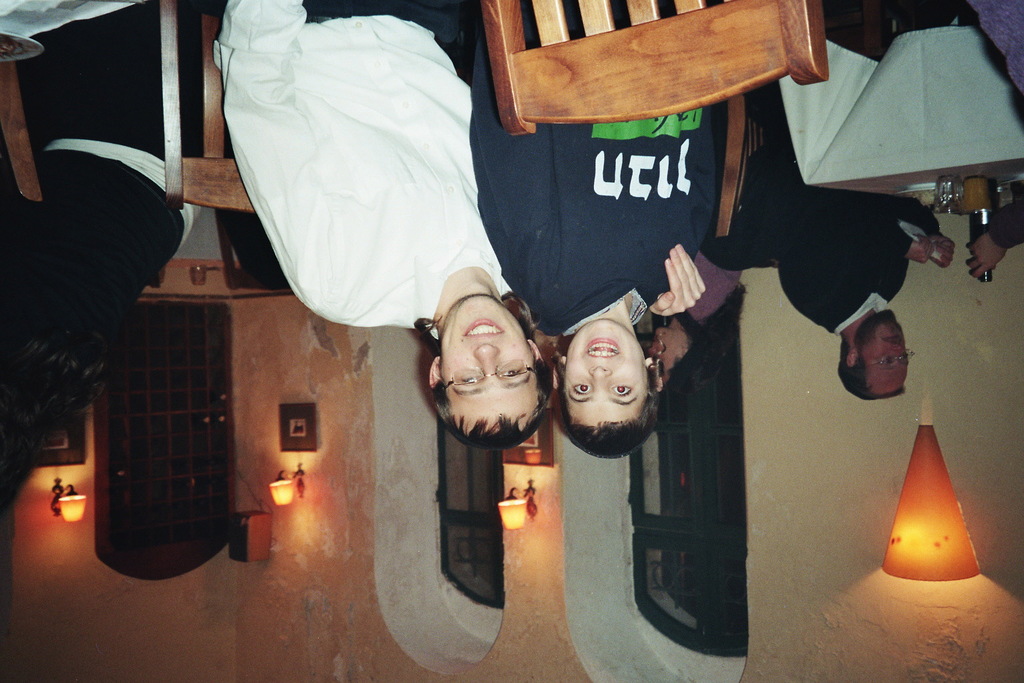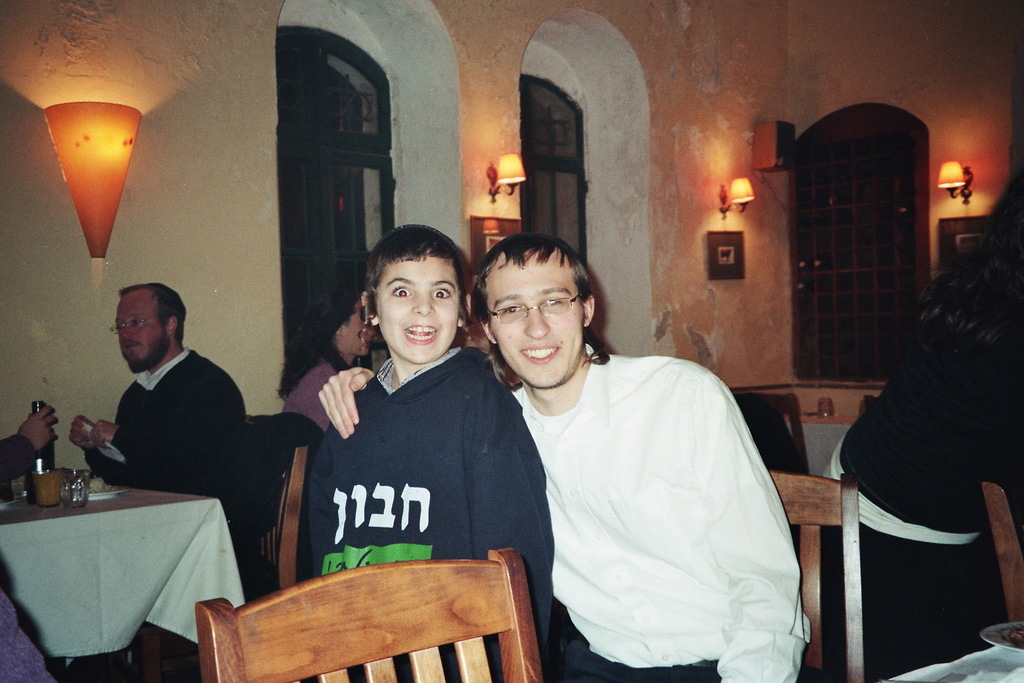Adopting Shmuel
A happy family shares the true story of a spontaneous decision
By Michael OrbachIssue of August 8, 2008
Back in 2005, looking to make some extra money while I finished my great American Jewish novel, I substituted as a teacher’s aide in a local Jewish elementary school. In the small special education classroom I met Shmuel, then known as Richie. Met, in this case, is a strong word for the whirling mass of limbs that was Shmuel as he was barely controlled by a small army of special education teachers, teacher’s aides and shadows.
I think at some point during a lunch break I glanced at Shmuel and realized that he seemed to me like an encapsulation of the teenagers-at-risk currently affecting the Jewish community. An out-of-control boy that couldn’t have been more than four feet tall and seven years old, I didn’t want to see him in 10 minutes, much less 10 years. Later that day, he threw a book at my head.
Flash forward three years later and I’m sitting on a parked red van in Kew Gardens Hills talking to Shari, Shmuel’s new mother, as we watch Shmuel ride his scooter with some neighborhood children. Every minute or so, Shari seamlessly interrupts our conversation and tells Shmuel to do something, or more often than not, not to do something. When he answers, she also makes sure that Shmuel makes perfect eye contact with her.
Her voice is loud but not too loud, perfectly modulated as she admonishes or praises. After years of work in education and special education, I can’t help but think I’m in the presence of an almost-perfect parent.
Trouble approaches when Shmuel finds a bike too small for him. He gets on it and my conversation with Shari is interrupted again. It’s dangerous, she tells Shmuel; he looks away and continues riding. She gives him till she counts down from three to get off the bike, and I fear the worst.
“Three.”
I think I can hide behind the van before anything too bad happens.
“Two.”
My notebook has a hard cover that’ll make a perfectly good shield for my face.
“One.”
I think plastic surgery can cover most surface scars, right?
And then, remarkably, nothing happens. Or, more precisely, something happens.
Shmuel looks up, smiles at his mother and gets off the bike. He then wheels the bike to where he found it. I breathe deep and realize that my notebook would’ve made a lousy shield. Shari tells Shmuel he’s doing a great job of listening and then without a moment’s hesitation asks: “Where were we?”
Two weeks before this, my editor at The Jewish Star handed me an assignment covering the new Ohel foster-care and adoption advertising campaign. The reason why the ads caught our attention was because they used real people instead of stock photos, which is a novelty in our very quiet Jewish community. As I do an initial look through the ads, I notice Shmuel sitting next to his brother Ephraim with a smile so large I can’t help but wonder how it fits on his seven-year old head.
Shmuel’s story began long before I met him. Shmuel was placed in foster-care when he was less than two years old, and until the Weisses adopted him, he’d been through six foster homes and two failed adoptions. For the majority of his life, Shmuel never had a truly permanent home. The day in school I was with Shmuel three years ago was a particularly bad one for him, since a foster-father had promised to visit, but at the last minute changed his mind. Things were going badly for Shmuel.
And then Shari, her husband Steven, and her son Ephraim, entered the picture.
I knew Shari from my time working in Simcha Day Camp. She was the all-powerful matriarch of the legendary computer room, where computers are fought over like prized heirlooms, and the computer that has the only working version of Backyard Football is the Holy Grail. She’s a short, friendly, intelligent woman, who has a clear view of the world and an honest opinion that can rattle even the most overconfident counselors.
In August of 2005, Shari was working in the Simcha Day Camp computer room. She was busy working during the school year as a teacher in Shevach and her son Ephraim was making plans to attend yeshiva in Israel the following year. Walking down the tiled hallway of the camp, Shari saw Shmuel holding the hand of his social worker, whom Shari had met at a Shabbat table a few weeks before.
“I had no plans of adopting anyone,” Shari said, laughing. “Here I was getting ready for an empty nest and then I see the most gorgeous boy without a home, and I realized I was going to adopt him. Without question.”
After getting to know Shmuel in camp, Shari and her husband Steven went to their first Ohel meeting three weeks later. Shmuel moved in during the month of December. On June 13, 2007, the official adoption was completed (adoption is a lengthy process in New York State).
Shmuel came to the Weiss house with a small box of clothing and a bag of ragged clothing; they received him with open arms. However, when they first told him that they were planning on adopting him, Shmuel was aghast.
“He said he didn’t want to be adopted,” Shari said as Shmuel wheeled by us, a happy yellow blur with tzitzis and a blue knitted yarmulke, “Adoption, Shmuel told us, meant being kicked out of the house. When we told him that it didn’t mean that he asked us if we had ever been adopted. We said no, and Shmuel said he had been adopted twice. And he was sure it meant getting kicked out of the house.”
Instead of adoption, the term used in the Weiss household became Changing-Your-Name-Legally.
The process of getting used to his new family has taken some adjusting for Shmuel. When the family went on vacation after Shmuel moved in, Shmuel thought they, like his previous foster parents, would leave him behind. Trust was hard for Shmuel as he’d been let down so much in the past.
“If you trust, you’re going to get hurt,” Shari said describing Shmuel’s experiences.
The transition in Shmuel is startling. As I watched him listen dutifully and go back in the house, I couldn’t help wondering if the Shmuel I saw now was a completely different child than the one I had met years ago.
These days, Shmuel is enrolled in a regular classroom with a shadow and is catching up to his peers. A recent IQ test put him far above the average. He learned how to read late, but now reads vociferously (Shari says they only get the Hamodia, since Shmuel reads everything cover-to-cover and when they were getting other newspapers there were too many careful explanations). He loves his new family and idolizes his big brother Ephraim, who was featured with him in the Ohel ad campaign.
“They get along really well because Shmuel thinks Ephraim is G-d and Ephraim has the patience of a saint,” Shari said.
Shari is very careful to give credit to everyone who helped Shmuel along the way. She is thankful to her community, who she says supported Shmuel thoroughly, even throwing a baby shower once he moved in. His school, Tifereth Moshe, was the only school willing to take Shmuel in a mainstream class and where Shari says that everyone, including the principal, is a cheerleader for him. She also credits the Diamond Program at Simcha Day Camp and their parenting classes (full disclaimer: I worked as a counselor for an early incarnation of the Diamond Program a number of years ago). Yitzy Goldberg, the head of the Diamond Program, was also the one who suggested mainstreaming Shmuel to a regular classroom.
“We realized that most of Shmuel’s issues were emotionally based,” Yitzy said in a phone interview. “Once Shari came into the picture, he got the structure and security he really needed to grow.”
One of the most helpful pieces of advice, Shari says, came from her brother who also adopted a child. When she was adopting Shmuel, he told her that she shouldn’t feel guilty if she didn’t love him right away. However, it wasn’t such an issue for Shari and her family.
“It was like dating, there was an immediate click,” Shari said, likening meeting Shmuel to meeting her husband.
Shmuel recently chose a middle name for himself. His first choice was Shmuel Hanavi, but that was vetoed because it wasn’t a name. His second choice, Shmuel Nachshon ben Aminadov, was vetoed since it was a sentence.
Shmuel’s final choice was Shmuel Aryeh, which was made his legal name at the time of the adoption, and was also the name of Steven’s grandfather.
However, as much good as the adoption did for Shmuel, Shari maintains that the benefit has been mutual.
“He’s completed our family.”
Ephraim and Shmuel learn Chumash every Friday morning via phone, and when the adoption went through its final stages in front of a New York Judge, a speakerphone was placed in the court so Ephraim could hear it from Israel. Adopting Shmuel has also finalized Ephraim’s career plans to become a clinical psychologist. Steven, a doctor specializing in infectious diseases, has discovered a love of coaching soccer and t-ball (I assume it’s instead of a mid-life crisis).
“It’s the toughest job I’ve ever loved,” Shari said.
Later, Shmuel listened into our conversation as he sat quietly next to me reading a Spiderman comic book. On one side of the bookshelf sat a picture of Ephraim and on the other side, one of Shmuel. In the middle of the shelf was a picture of the whole family.
As Shmuel went to brush his teeth, Shari mentioned that lately Shmuel’s been asking about another sibling. And when he’s ready, she said, they will definitely think about another addition to the Weiss family.









